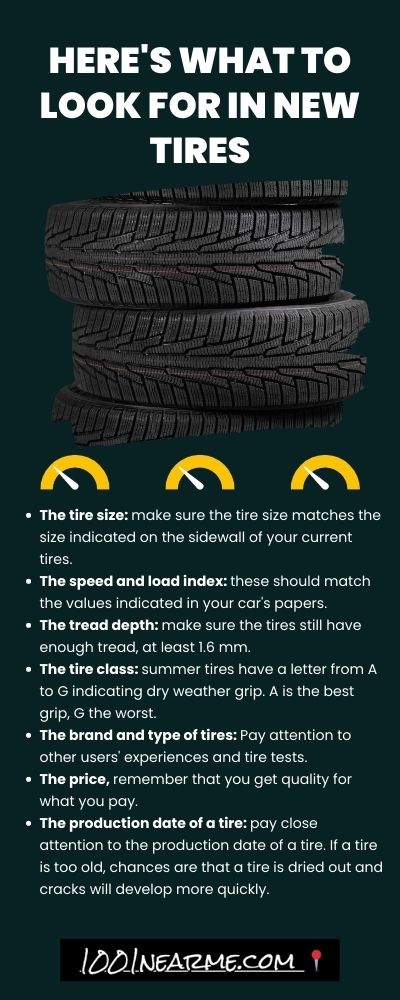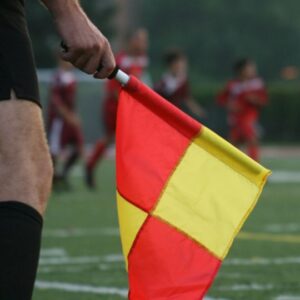A user tire or summer tire is usually harder than a winter tire. For summer tires, grip is less important than for a winter tire. With softer summer tires, you tend to consume more fuel or energy.
When should you change winter tires for summer tires?
When the temperature is above 7 degrees and no more winter precipitation is expected, winter tires are usually changed for summer tires. In practice, this is usually in the month of April. Winter tires are changed for summer tires when the temperature is below 7 degrees. Winter tires are designed for low temperatures and lose grip and tread when it gets warmer than 7 degrees. A good time to change is the month of November. You are then least likely to be overwhelmed by winter precipitation.
What to pay attention to when buying summer tires
When buying summer tires, you should pay attention to the following things:
- The tire size: make sure that the tire size matches the size indicated on the sidewall of your current tires.
- The speed and load index: these should match the values indicated in your car’s papers.
- The tread depth: make sure the tires still have enough tread, at least 1.6 mm.
- The tire class: Summer tires have a letter from A to G indicating dry weather grip. A is the best grip, G the worst.
- The brand and type of tires: Pay attention to other users’ experiences and tire tests.
- The price, remember that you get quality for what you pay.
- The production date of a tire: pay close attention to the production date of a tire. If a tire is too old, chances are that a tire is dried out and cracks will develop more quickly.
Directly buy summer car tires
Want to buy summer car tires right away? Then specify the season you need tires for, the width, height and number of inches. Also choose what category of tire you want (A-brands, price/quality or budget tires). Finally, you can choose whether you want to mount yourself or outsource the mounting.
There are several ways to buy tires:
- Tire stores: These are specialty stores where you can buy tires, they often have a wide range of different brands and models.
- Car dealers: Many car dealers also sell tires, they often have a limited selection but can mount the tires directly on the car.
- Online: There are many online stores that sell tires. Here you can often choose from a large selection of different brands and models and often benefit from lower prices.
It is advisable to compare different options and see which one best suits your situation. Remember to check tire size, speed and load index, tread depth, tire class, brand and type of tires and price before making a purchase.
Summer tire test – what are the best tires?
There are several organizations that conduct tire tests. These organizations test tires on various aspects such as grip, braking performance in dry and wet, rolling resistance, wear, environmental requirements such as consumption and emissions and noise emissions. The results of these tests are often published in magazines, on websites or in special tire books. This allows you to make an informed choice for your new tires and select the ones that best suit your situation.
Keep in mind, however, that the results of tire tests do not always apply to everyone. It is advisable to consult the test results, but also to consider your own wishes and situation.
Driving in snow with summer tires
It is not recommended to drive in the snow with summer tires. Summer tires are designed for use in higher temperatures and do not have the right characteristics for driving in snow or on black ice. The rubber compound of summer tires is softer than that of winter tires, so summer tires have less grip on snowy or icy roads. In addition, summer tires do not have grooves or sipes that sweep away the snow, leading to poor performance on snowy or icy roads.
Driving with summer tires in snow or sleet can lead to an increased risk of accidents, so it is advisable to use winter tires in winter conditions. If you do have to drive in these conditions, it is advisable to drive as carefully as possible, taking into account the weather conditions and the traffic situation.
How long do car tires last
The life of car tires depends on several factors, such as driving behavior, maintenance, weather conditions and the quality of the tires. It is important to check the tread depth regularly. The minimum tread depth for tires in the Netherlands is 1.6 mm, when the tread depth falls below this limit it is advisable to replace the tires.
Keep in mind that tires often used on a race track or in extreme weather conditions wear out faster than tires used only for daily use. Moreover, there are tires that have a longer lifespan, such as run-flat tires.
Thus, it is advisable to regularly check the tread depth and replace tires if they fall below the limit, or if other problems such as cracks or damage occur.
Some car tire brands with what they are known for:
There are many different tire brands for summer tires and winter tires available on the market, below are some well-known brands:
- Michelin: A French brand known for the high quality of their tires and good performance in various weather conditions.
- Continental: A German brand focused on innovation and technology, known for the good performance and longevity of their tires.
- Goodyear: An American brand with a wide range of tires for different types of vehicles, known for good performance and long life.
- Pirelli: An Italian brand known for the sporty performance and high quality of their tires.
- Bridgestone: A Japanese brand known for the high quality of their tires and good performance in various weather conditions.
- Dunlop: A brand that is part of Goodyear, known for the good performance and longevity of their tires.
- Hankook: a South Korean tire brand, known for the good performance, long life and favorable price-quality ratio.
These are just a few well-known brands; there are many more available. However, it is important to note that a well-known brand does not always equal a good choice. It is advisable to compare different brands and choose the tires that best suit your situation.




















